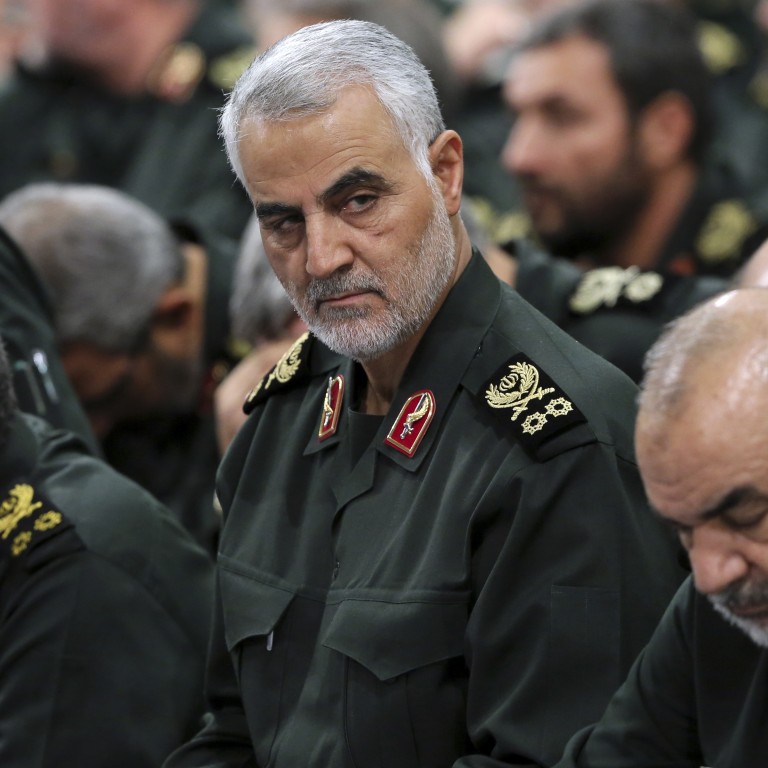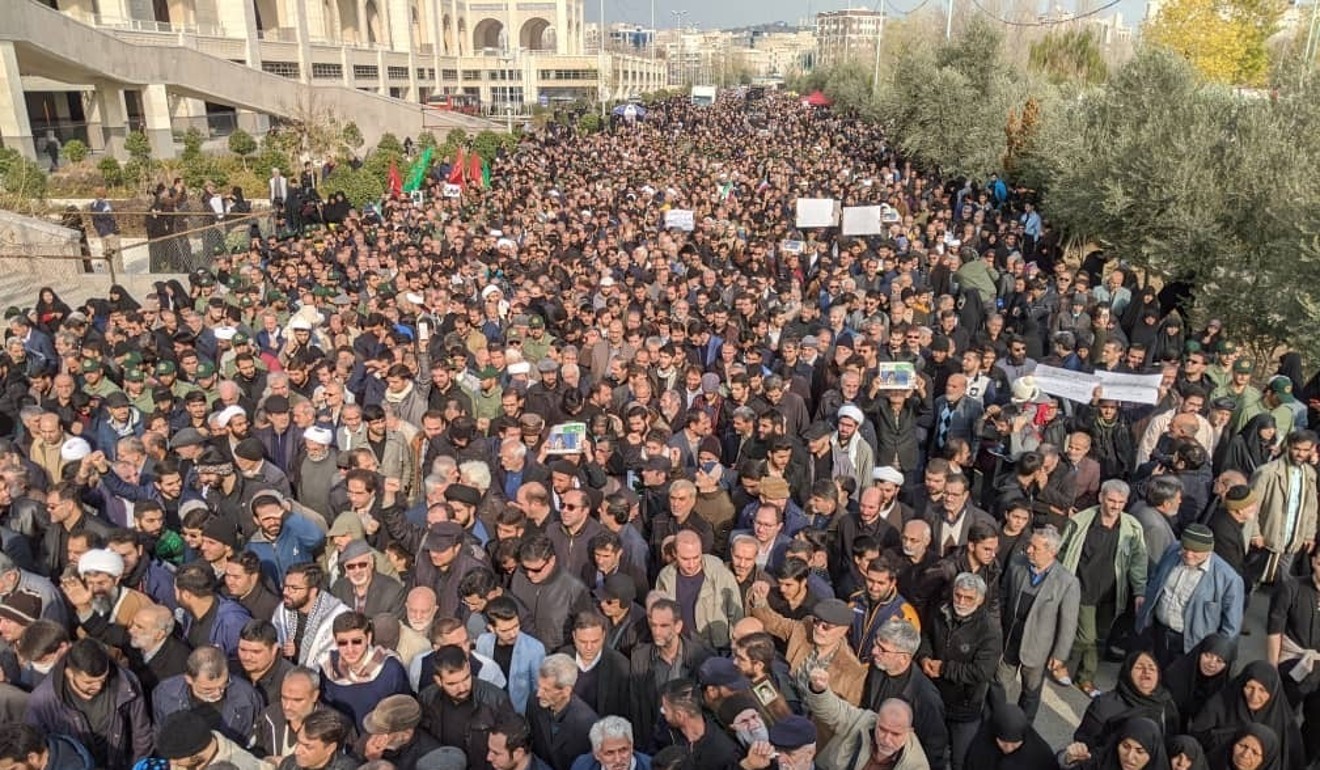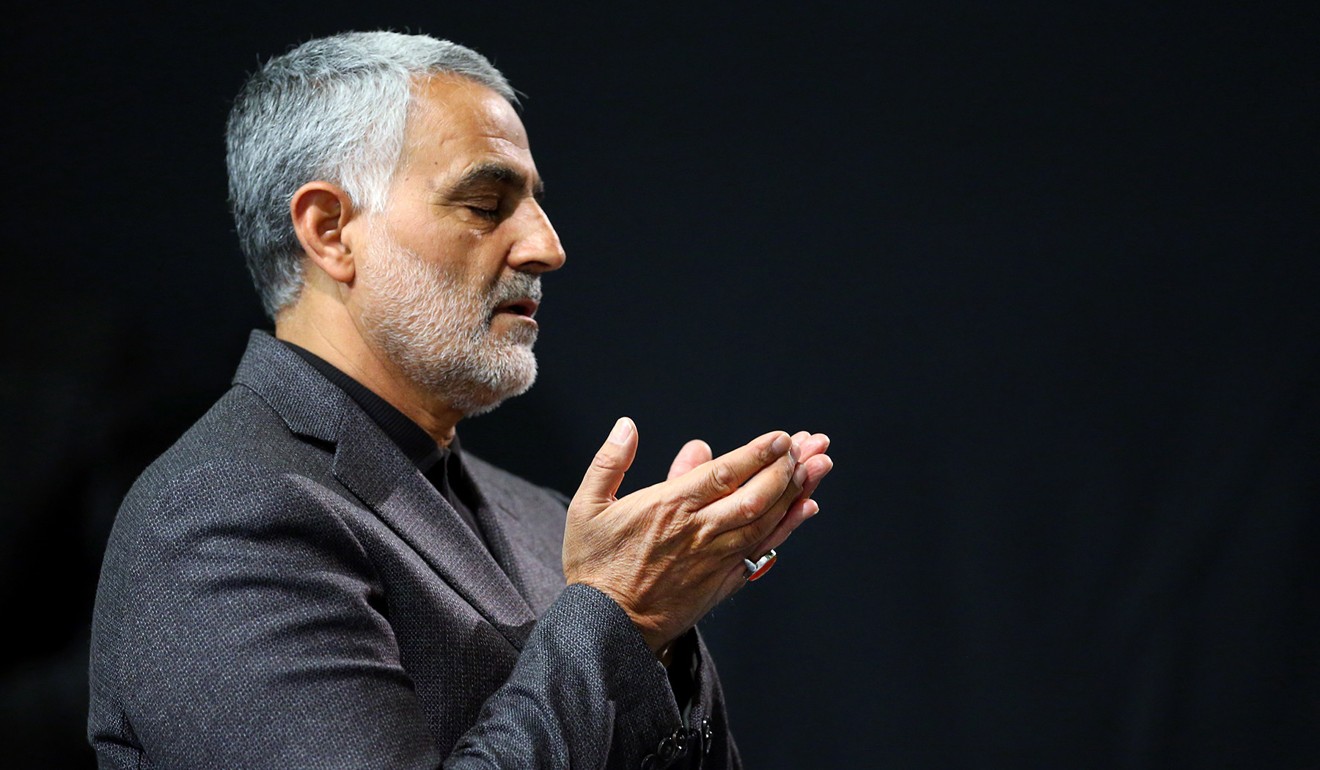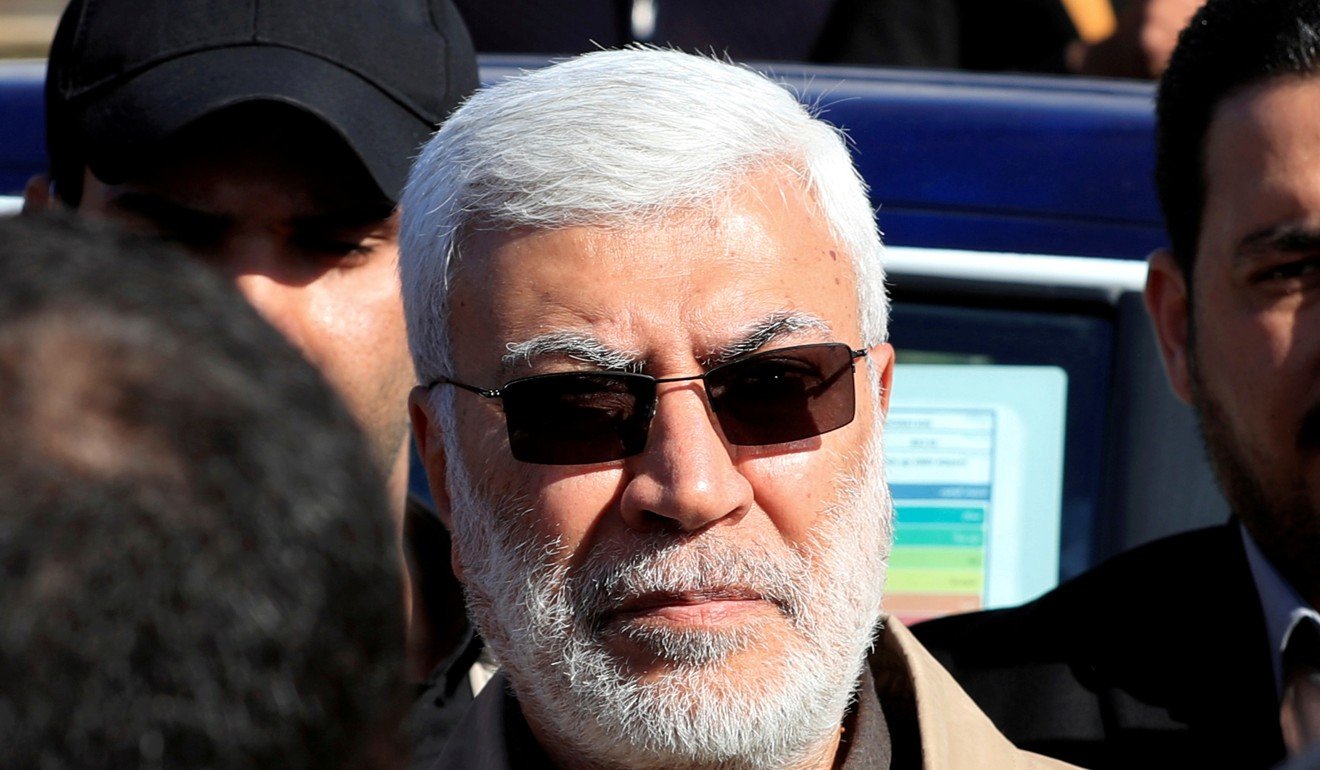
Iran vows revenge after US strike kills top military commander Qassem Soleimani
- Trump said Soleimani was plotting to kill Americans and he should have been taken out ‘many years ago’
- Soleimani developed a reputation as one of the most powerful and mysterious men in the Middle East, overseeing Iranian operations abroad
Top Iraqi militia commander Abu Mahdi al-Muhandis, an adviser to Soleimani, was also killed in the attack.
Iran has been locked in a long conflict with Washington that escalated sharply last week with an attack on the US embassy in Iraq by pro-Iranian militiamen following a US air raid on the Kataib Hezbollah militia, founded by Muhandis.
“At the direction of the president, the US military has taken decisive defensive action to protect US personnel abroad by killing Qassem Soleimani,” the Pentagon said in a statement.
“This strike was aimed at deterring future Iranian attack plans,” it added.
A senior US defence official said Soleimani was killed in a “precision drone strike”. Iran’s Revolutionary Guards said he was killed in an attack by American helicopters.
Iraqi paramilitary groups said three rockets landed near Baghdad airport’s cargo terminal, hitting two vehicles and killing five Iraqi paramilitary men and two “guests”.
Pictures showed burning debris on an airport road.
Iran’s Supreme Leader Ayatollah Ali Khamenei said harsh revenge awaited the “criminals” who killed Soleimani. His death, though bitter, would double the motivation of the resistance against the US and Israel, he said.
Khamenei called for three days of national mourning and appointed Esmail Qaani as the new head of the Quds Force.
“Following the martyrdom of the glorious general haj Qasem Soleimani, I name Brigadier General Esmail Qaani as the commander of the Quds Force of the Islamic Revolutionary Guard Corps,” he said in a statement posted on his official website.
Soleimani, who led the Quds Force, the foreign arm of the Revolutionary Guards and had a key role in fighting in Syria and Iraq, had acquired celebrity status at home and abroad. Over two decades he had been at the forefront of projecting the Islamic Republic’s military influence across the Middle East.
Iranian state television presenters wore black and broadcast footage of Soleimani peering through binoculars across a desert and greeting a soldier, and of Muhandis speaking to followers.
President Hassan Rowhani said the assassination would make Iran more decisive in its resistance to the US while Iran’s Revolutionary Guards said anti-American forces would exact revenge across the Muslim world.
On Twitter, Iranian Foreign Minister Javad Zarif condemned the “act of international terrorism” as “extremely dangerous”.
“The US bears responsibility for all consequences of its rogue adventurism,” he wrote.
Khamenei’s adviser Ayatollah Ahmad Khatami said Americans will never enjoy peace of mind again after the killing of Soleimani.
“I am telling Americans, especially Trump, we will take a revenge that will change their daylight into a night-time darkness,” he said.
Tens of thousands of people took to the streets of Tehran to protest against American “crimes” on Friday. Women and men, many of them elderly, took part in the procession, some holding up portraits of Soleimani and Khamenei.
“The axis of any evil is America, the motto of religion and the Koran is death to America,” they said in unison.
In a tweet Trump, who is facing impeachment charges, said Soleimani was planning to kill Americans.
“General Qassem Soleimani has killed or badly wounded thousands of Americans over an extended period of time, and was plotting to kill many more...but got caught! He was directly and indirectly responsible for the death of millions of people, including the recent large number of PROTESTERS killed in Iran itself,” the president wrote on Twitter.
“While Iran will never be able to properly admit it, Soleimani was both hated and feared within the country. They are not nearly as saddened as the leaders will let the outside world believe. He should have been taken out many years ago!”
Secretary of State Mike Pompeo said that the US was “committed to de-escalation” with Iran.
Pompeo tweeted that he had spoken with British Foreign Secretary Dominic Raab and Chinese Politburo member Yang Jiechi about the killing.
“Thankful that our allies recognise the continuing aggressive threats posed by the Iranian Quds Force,” he wrote. “The US remains committed to de-escalation.”
“He was actively plotting in the region to take actions – a big action as he described it – that would have put dozens if not hundreds of American lives at risk. We know it was imminent,” Pompeo told CNN.
“These were threats that were located in the region,” Pompeo added. “Last night was the time that we needed to strike to make sure that this imminent attack … was disrupted.”
The US embassy in Baghdad urged all American citizens to depart Iraq immediately.
General Qassem Soleimani has killed or badly wounded thousands of Americans over an extended period of time, and was plotting to kill many more...but got caught! He was directly and indirectly responsible for the death of millions of people, including the recent large number of PROTESTERS killed in Iran itself.
“While Iran will never be able to properly admit it, Soleimani was both hated and feared within the country. They are not nearly as saddened as the leaders will let the outside world believe. He should have been taken out many years ago!
US House of Representatives Speaker Nancy Pelosi, a Democratic and strong critic of the president, said the attack was carried out without consultation with Congress and without authorisation for the use of military force against Iran.
“America – and the world – cannot afford to have tensions escalate to the point of no return,” Pelosi said.
Former vice-president Joe Biden, the front runner to face Trump in the US presidential election in November, called the attack a “hugely escalatory move in an already dangerous region”.
“President Trump just tossed a stick of dynamite into a tinderbox, and he owes the American people an explanation of the strategy and plan to keep safe our troops and embassy personnel, our people and our interests, both here at home and abroad, and our partners throughout the region and beyond,” Biden’s statement said.
“Long in the making, this was a decisive blow against Iran’s malign Quds Force activities worldwide. Hope this is the first step to regime change in Tehran,” former US national security adviser John Bolton tweeted.
Qassem Soleimani was Iran’s ‘living martyr’ in war against US and Israel
Prime Minister Adel Abdul Mahdi condemned the killings as a violation of the conditions of the US military presence in Iraq and an act of aggression that breached Baghdad’s sovereignty and would lead to war.
“The assassination of an Iraqi military commander who holds an official position is considered aggression on Iraq … and the liquidation of leading Iraqi figures or those from a brotherly country on Iraqi soil is a massive breach of sovereignty,” Abdul Mahdi said.
He said the US air strike was “a dangerous escalation that will light the fuse of a destructive war in Iraq, the region, and the world.”
Shiite cleric Moqtada al-Sadr, who portrays himself a nationalist rejecting both Iranian and US influence, ordered his followers to be ready to defend Iraq and urged all sides to behave wisely.
The Syrian government of President Bashar al-Assad, long supported by Iran, condemned what it called criminal US aggression.
United Arab Emirates Minister of State for Foreign Affairs Anwar Gargash said that wisdom and political solutions must prevail over confrontation and escalation.
Prime Minister Benjamin Netanyahu cut short a trip to Greece and Israeli Army Radio said the military had gone on heightened alert.
“Just as Israel has the right of self-defence, the United States has exactly the same right,” Netanyahu said in a statement.
“Qassem Soleimani is responsible for the death of American citizens and many other innocent people. He was planning more such attacks.”
China on Friday appealed for restraint from all sides, “especially the US” following the killing of Soleimani.
“China has always opposed the use of force in international relations,” foreign ministry spokesman Geng Shuang said at a press briefing.
“We urge the relevant sides, especially the US, to remain calm and exercise restraint to avoid further escalating tensions.”

Moscow warned on Friday that the US offensive would boost tensions across the Middle East.
“The killing of Soleimani … was an adventurist step that will increase tensions throughout the region,” news agencies RIA Novosti and TASS quoted the foreign ministry as saying.
“Soleimani served the cause of protecting Iran’s national interests with devotion. We express our sincere condolences to the Iranian people.”
Raab said Britain had “always recognised the aggressive threat” posed by Soleimani and his Quds Force, adding: “Following his death, we urge all parties to de-escalate. Further conflict is none of our interests.”
“We are at a dangerous point of escalation. It is now important through prudence and restraint to contribute to de-escalation,” said German Chancellor Angela Merkel’s spokeswoman Ulrike Demmer.
“We have woken up to a more dangerous world,” France’s Europe Minister Amelie de Montchalin told French radio, saying President Emmanuel Macron would consult soon with players in the region.
“The cycle of violence, provocations and retaliations which we have witnessed In Iraq over the past few weeks has to stop,” European Council president Charles Michel said.
The slain commander’s Quds Force, along with its stable of paramilitary proxies from Lebanon’s Hezbollah to Iraq’s Popular Mobilisation Forces grouping of Iran-backed militias – battle-hardened militias armed with missiles – has ample means to launch a multipronged response.
Iran, for its part, has absorbed scores of air strikes and missile attacks, mainly carried out by Israel against its fighters and proxies in Syria and Iraq.
But analysts said Iran is likely to respond forcefully to the targeting of Soleimani, who it has built into a legend as its influence has spread across the region in the wake of the US-led invasion of Iraq in 2003 and subsequent occupation.
Phillip Smyth, a US-based specialist in Shiite armed groups, said the strike would have “bigger” ramifications than the 2011 US operation that killed al-Qaeda chief Osama bin Laden and the 2019 American raid that killed Islamic State group leader Abu Bakr al-Baghdadi.
“In terms of a decapitation strike, what just happened is the most major decapitation strike that the US has ever pulled off,” Smyth said. “There is no comparison.”
“Trump changed the rules – he wanted (Soleimani) eliminated,” said Ramzy Mardini, a researcher at the US Institute of Peace.
Soleimani “did not appreciate that his actions of threatening another hostage crisis at the (US) embassy changed the way things were going to be done,” Mardini said.

Soleimani warns US and Trump: ‘If you begin the war, we will end it’
Soleimani had survived several assassination attempts against him by Western, Israeli and Arab agencies over the past two decades.
The Quds Force, tasked with carrying out operations beyond Iran’s borders, shored up support for Syria’s Assad when he looked close to defeat in the civil war raging since 2011 and also helped militiamen defeat Islamic State in Iraq.
Soleimani became head of the force in 1998, a position in which he kept a low profile for years while he strengthened Iran’s ties with Hezbollah in Lebanon, Syria’s government and Shiite militia groups in Iraq.
Muhandis, who was killed with Soleimani, oversaw Iraq’s PMF, a grouping of paramilitary groups mostly consisting of Iran-backed Shiite militias that was formally integrated into Iraqi armed forces.
His Kataib Hezbollah militia, which received battlefield training from Lebanon’s Hezbollah, has long targeted US forces and was one of the earliest groups to send fighters to Syria to support Assad.
In 2009, Washington declared Kataib Hezbollah a foreign terrorist organisation, saying it threatened stability in Iraq and declared Muhandis a terrorist. In 2007, a Kuwaiti court sentenced him to death in absentia for his involvement in the 1983 US and French embassy bombings in Kuwait.
Iran’s ambassador to Iraq told state television that Soleimani’s body would be sent to Iran.
The breach at the embassy followed US air strikes on Sunday that killed 25 fighters of the Iran-backed militia in Iraq, the Kataeb Hezbollah. The US military said the strikes were in retaliation for last week’s killing of an American contractor in a rocket attack on an Iraqi military base that the US blamed on the militia.

US officials have suggested they were prepared to engage in further retaliatory attacks in Iraq.
“The game has changed,” Defence Secretary Mark Esper said on Thursday, telling reporters that violent acts by Iran-backed Shiite militias in Iraq – including the rocket attack on December 27 that killed one American – will be met with US military force.
Trump blames Iran as Iraqi protesters storm US embassy over air strikes
He said the Iraqi government has fallen short of its obligation to defend its American partner in the attack on the US embassy.
The developments also represent a major downturn in Iraq-US relations that could further undermine US influence in the region and American troops in Iraq and weaken Washington’s hand in its pressure campaign against Iran.
Additional reporting by Associated Press and Agence France-Presse

